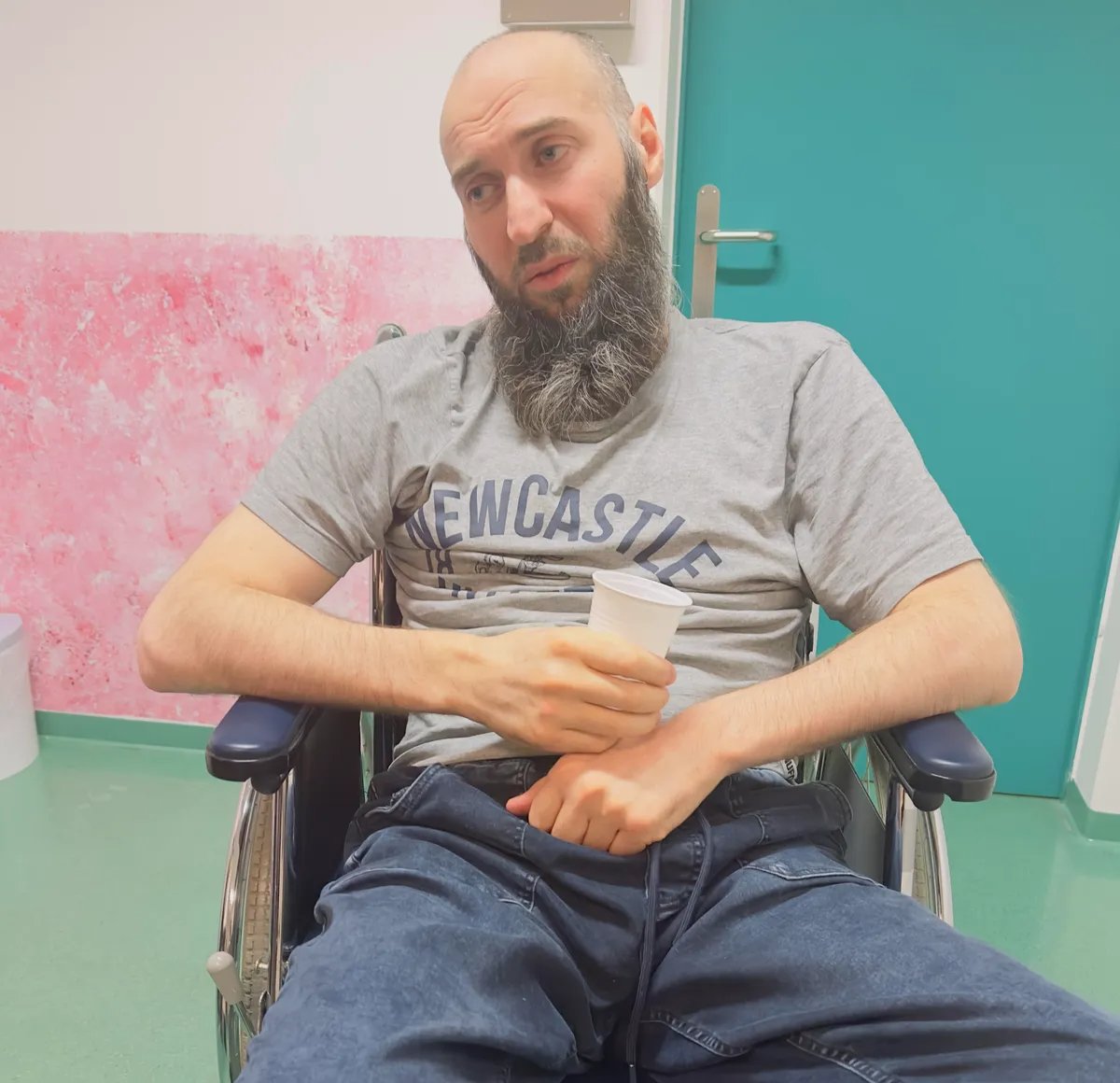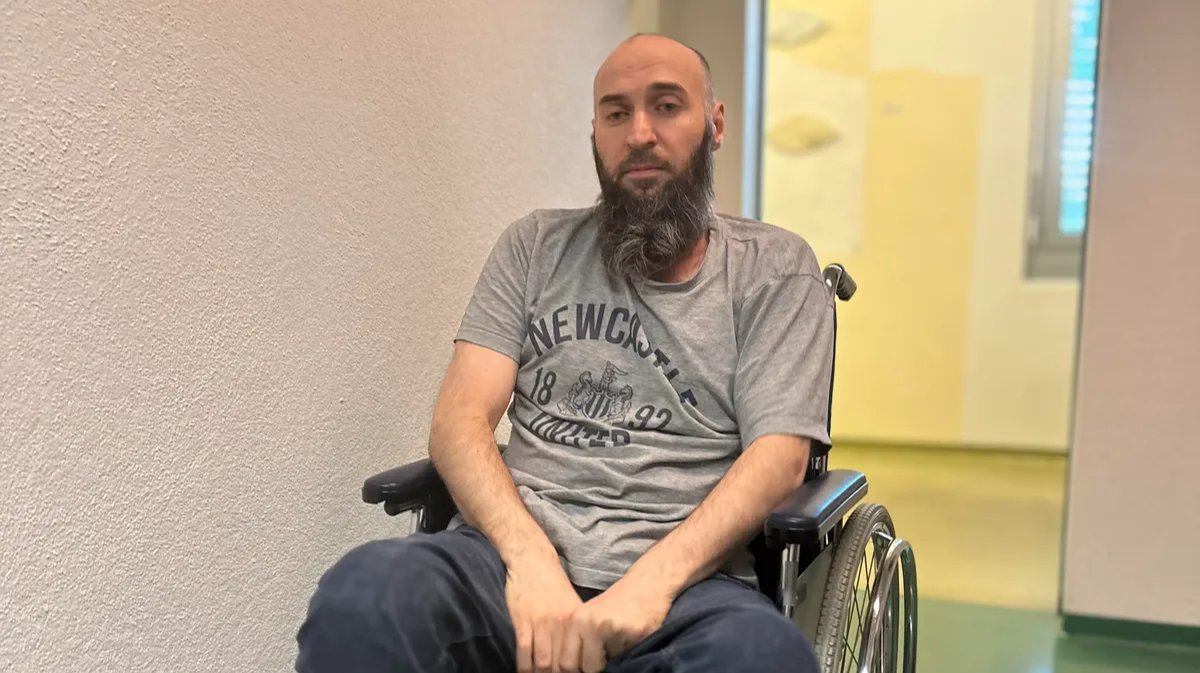Ali Batayev, a 40-year-old ethnic Chechen, is now in a Swiss deportation centre. Batayev is a Russian citizen who was living in the Ukrainian city of Odesa with his wife Olga until the Russian invasion, at which point they had to leave.
Batayev travelled to Switzerland where he applied unsuccessfully for asylum and now risks deportation to Russia, which would likely put his life in danger due to his opposition to the Kremlin-installed head of Chechnya Ramzan Kadyrov, whose agents have reportedly already “visited” his father and uncle who live there.
Novaya Gazeta Europe spoke to Batayev and his wife about how he ended up living in Ukraine, why he decided to go to Switzerland, and what deportation to Russia might mean for him.
After 6 PM, Ali Batayev is allowed to use the phone. Zurich’s deportation centre bans inmates from using the Internet — only allowing them to use Skype twice a week.
In fact, phones are also banned, but thanks to local human rights activists, Batayev is allowed one in the evenings as his Ukrainian wife, Olga, is still in Odesa, which gets shelled regularly. Being unable to call her to make sure that she’s alive and that her home hasn’t been destroyed has been a hellish experience. Now, Batayev calms down when he hears Olga saying she is alive, and Olga calms down when she hears Ali saying that he has not been deported.
Batayev belongs to a generation of Chechens who by their early twenties had already survived two wars and faced a stark choice: accept Ramzan Kadyrov’s rule, join the underground resistance, or leave Chechnya.
“Kadyrov’s rule is an occupation. To accept it meant giving up one’s own dignity, identity, and the traditions of our people,” Batayev says, explaining his decision to leave Russia.
Bataev initially travelled to several countries — Turkey, the UAE, Sweden — where he worked as a long-distance truck driver before eventually settling in the Ukrainian port city of Odesa, where he met his future wife. Ali obtained a residence permit and started to work in the confectionery business.
Like her husband, Olga is an entrepreneur — and a Muslim. She works in advertising, so between them the couple was able to donate money to the Sheikh Mansur Battalion, a group of Chechen volunteers fighting alongside the Ukrainian armed Forces.
“The war didn’t start on 24 February,” says Olga. “The full-scale invasion began on 24 February, but the war has been going on since 2014.” The Sheikh Mansur Battalion has been fighting since 2014 and is being helped by Muslims from all over Ukraine, Olga says.
Since the start of the full-scale invasion on 24 February, all holders of Russian passports in Ukraine, regardless of their type of residence permit, have had both their personal and business bank accounts suspended. Olga explains that commercial banks stopped providing services to Russian citizens altogether. “Ali understood perfectly well why this was happening and he had no hard feelings. We were just wondering what to do about it.”
As the invasion continued, Russian troops were soon approaching Mykolaiv, a city just 120 kilometres from Odesa. From the south, the Kadyrovites were among the first troops to enter Ukraine, Olga says. “In the first days of the war, not everyone in Ukraine made the distinction between Kadyrovites and Chechens. Emotions were strong.”
Ali attempted to enlist in the Ukraine’s Territorial Defence Forces, but was refused on the grounds that he was both Chechen and a Russian citizen. Instead, he opted to travel to Europe where he hoped to get temporary protection status that would allow him to work. Olga stayed in Ukraine to take care of their pets, though they agreed she would join her husband in Europe if the situation in Odesa got much worse.
In early March, Ali crossed the Ukrainian-Slovak border. Once in the EU, his Chechen ethnicity and Russian passport frequently aroused suspicion and he was routinely taken away for questioning. Upon arrival in Switzerland, Batayev found the authorities were disinclined to approve his asylum application, despite his documents being in order, due to his Russian citizenship.
The letter rejecting Batayev’s application argued that since Batayev had a valid Russian passport, he was not dependent on Swiss protection, and that he could choose where to live in Russia and didn’t have to return to Chechnya.
The letter also claimed that Russia was not in a state of generalised violence, though it accepted that the situation could be considered tense due to the war, a claim that was subsequently upheld by a Swiss court.
“I was beside myself for several days after reading those lines,” Olga says. “I understand European civil servants: this is not their war. You cannot fully understand the war that’s in the news until you’re in the thick of it yourself.”
After Batayev’s appeal was rejected by a Swiss court, he was sent to a deportation centre. With his dream of working as a trucker to earn money to support his family and the Ukrainian military now dead, Batayev’s main concern became avoiding deportation to Russia.
Back in Ukraine, Olga tried every bureaucratic avenue to help her husband as did human rights activists and lawyers. They were told that the Swiss deportation order could be overturned if the Ukrainian authorities confirmed they would allow him to return, as Ali’s residence permit had expired after he left the country. However, the ongoing war means that it’s the military that now decides everything in Ukraine rather than civil servants. After Olga spoke with them, the military said they would readily pick Ali up at the Ukrainian border, while the commander of the Sheikh Mansur Battalion even wrote a letter confirming that Ali had supported them financially and that his return to Russia would therefore put him in danger. Despite this, Batayev remained in detention awaiting deportation.
In June, Batayev went on hunger strike to protest his planned deportation, something that got covered by several news websites in the Caucasus and even prompted protests by fellow Chechens outside Swiss embassies in various European cities. It was at this point that Kadyrov’s security forces paid a visit to Batayev’s family.
It’s unclear exactly what triggered this — the recent publicity around Batayev’s case or an official request by the Swiss authorities to confirm Batayev’s Russian citizenship, which the Chechen security services naturally received.

Ali Batayev in the hospital, where he was brought after 50 days of his hunger strike. Photo: Lachin Mamishov
“One night in July, Kadyrovites came to my parents in the village of Komsomolskoye,” — Batayev says over the phone, sounding weak and muffled after his 50-day hunger strike, explaining that he learnt the harrowing news from his wife, who is in touch with an uncle of his that has also left Chechnya. The Kadyrovites took Ali’s father and his brother away and interrogated them throughout the night.
When they demanded to know what Ali had been doing in Ukraine, his father explained that he had not seen his son for almost 20 years and did not know anything. In the morning, the men were released. “It was obviously a message that the siloviki sent me in their usual fashion,” Batayev says.
“I’ve never been a public figure, I don’t have any social media accounts, but now they’re definitely waiting for me. Russia has gone to war with Ukraine, and Chechnya has long been at war with its own people.”
Join us in rebuilding Novaya Gazeta Europe
The Russian government has banned independent media. We were forced to leave our country in order to keep doing our job, telling our readers about what is going on Russia, Ukraine and Europe.
We will continue fighting against warfare and dictatorship. We believe that freedom of speech is the most efficient antidote against tyranny. Support us financially to help us fight for peace and freedom.
By clicking the Support button, you agree to the processing of your personal data.
To cancel a regular donation, please write to [email protected]

